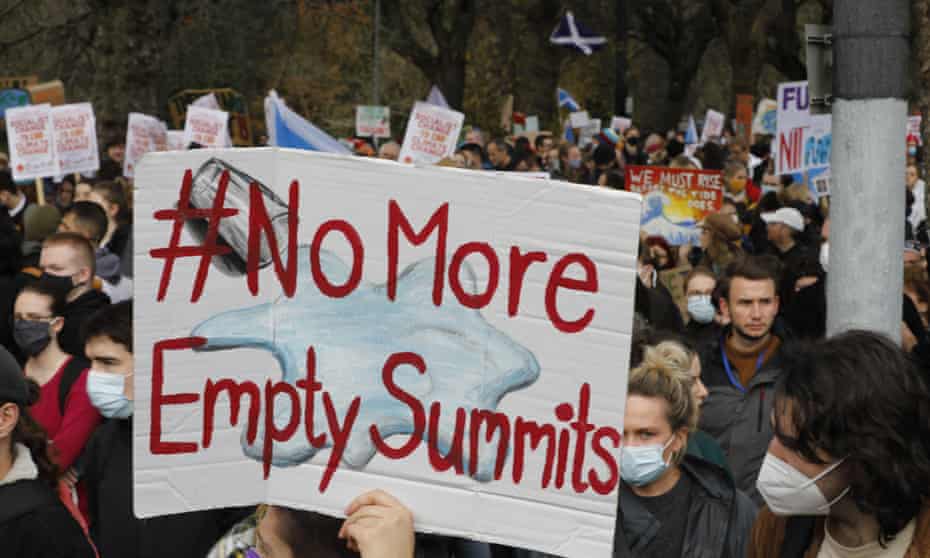Cop26: what’s still to be resolved in the week ahead
The ratchet issue is among several sticking points still to be finalised as negotiators return to the Cop26 table

Countries that have failed to come up with national plans on cutting greenhouse gas emissions in line with limiting temperature rises to 1.5C must be forced back to the negotiating table every year from now on, poor countries have said ahead of crunch talks at the Cop26 climate summit.
Current pledges are inadequate, and would lead to heating of 2.7C, according to UN calculations. But under the Paris agreement, countries are only required to ratchet up their pledges – known as nationally determined contributions (NDCs) – every five years, with the next deadline falling in 2025. Developing countries say this is much too late.
Lia Nicholson, lead negotiator for the Alliance of Small Island States, told the Guardian: “Major emitters have to step up their climate action now, not in 2025, backed by concrete steps like ending fossil fuel subsidies in the next few years. Scaled up, accessible climate finance needs to happen now for more ambitious climate action in developing countries, through grants and not debt. It’s time to get to work and live up to our grand pledges.”
However, the UK’s environment secretary, George Eustice, suggested in an interview with Times Radio on Sunday that a commitment on bringing countries back to the table with fresh pledges would not be included in the final decision from Cop26.
Christiana Figueres, the former UN climate chief who oversaw the Paris agreement, told the Guardian that countries returning every year was possible under the Paris agreement, and a plan to do so should be agreed in Glasgow.
“The most vulnerable countries have called for an annual reporting on increased ambition for all governments, especially the major emitting countries. This could be done as a new regular component of the yearly Cops, and is allowed under the Paris agreement,” she said. “[This] should be part of the agreed outcome of Cop26.”
The Climate Vulnerable Forum, made up of 55 developing countries most affected by the consequences of the climate crisis, has also called for a “Glasgow Emergency Pact” from the summit, which would include a requirement from all countries for annual reporting on emission reductions, on a voluntary basis.
“The climate emergency requires an annual review, and not just every five years,” said Saleemul Huq, director of the International Centre for Climate Change and Development in Bangladesh.
Ed Miliband, Labour’s shadow business secretary, and a veteran of the 2009 Copenhagen Cop, added: “If George Eustice represents the position of the government, it is deeply worrying and cannot be allowed to stand. All the evidence suggests we will leave Glasgow with a chasm between where we are and where we need to be to halve global emissions this decade and keep 1.5C alive. If the world decides not to revisit commitments on halving emissions until 2025, it will deliver a devastating blow to the prospects of keeping 1.5C alive.”
Some others have estimated that heating could be reduced to 1.9C or 1.8C, given other pledges made outside the Paris agreement, but these are controversial as they rely on many untested assumptions about countries fulfilling voluntary, and sometimes vague, promises. Only pledges made through the UN can be counted on, developing countries insist.
The discussion over when countries should return to the table – known as the acceleration, or ratchet, issue – is one of the key sticking points to a potential deal that the UK presidency is trying to put together in the second week of the Glasgow talks.
The first week was dominated by announcements of deals on preserving forests, galvanising climate finance from the private sector, and phasing out coal. The second week will focus on some of the hardest elements of the talks, including issues around the ratchet and:
-
Regulations on how countries measure and report on their emissions.
-
Whether, and how, carbon trading can play a role in how countries meet their commitments, under article 6 of the Paris agreement.
-
How countries can be helped to adapt to the impacts of the climate crisis, and how they can receive financial help for any impacts too great to be adapted to – known as loss and damage.
However, cracks are already appearing in the goodwill and constructive approach that appeared to characterise the first week of the talks.
Greenpeace accused Saudi Arabia of leading efforts to ensure that a commitment on accelerating the review of NDCs was off the table. Jennifer Morgan, executive director, said this was familiar behaviour from the oil producer: “Saudi Arabia is at the chess board, manipulating the pieces in an effort to stop an outcome that keeps 1.5C within reach. Other governments now need to isolate the Saudi delegation if they want this Cop to succeed for everyone, not just fossil fuel interests.”
Mohamed Adow, director of the Power Shift Africa thinktank, warned that developing countries would not accept a poor outcome. He criticised rich countries for failing to deliver $100bn to poor countries in climate finance, a target that was originally set for 2020 and now looks likely to be met only in 2023.
He warned: “The mood among developing countries is sour. Real progress needs to be made on adaptation funding and the setting up of a loss and damage mechanism to address those growing needs. Unless we get that developing countries will wonder why they bothered coming.”
